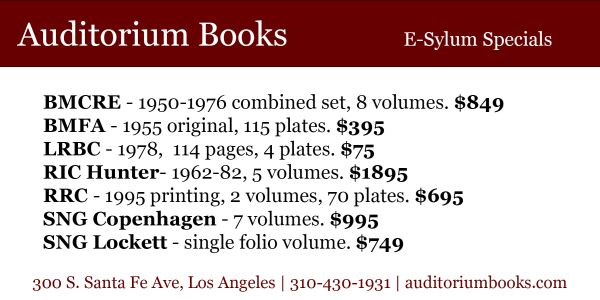
PREV ARTICLE
NEXT ARTICLE
FULL ISSUE
PREV FULL ISSUE
THE COINS OF GLADIATOR IICoinWeek published Mike Markowitz's article about the coins of the Roman Emperors portrayed in the recently-released movie, Gladiator II. Here's an excerpt - see the complete article online. -Garrett Gladiator II, Ridley Scott's long-awaited sequel to his film Gladiator (2000), was released to nearly universal derision by classicists. Put bluntly, the history in the film is a hot mess. However, while few people go to the movies to learn ancient history, the appearance of another Hollywood sword-and-sandal epic may stimulate greater interest in the actual Roman rulers represented so inaccurately on the screen. The brothers Caracalla and Geta–and their successor Macrinus–are major characters in the 2024 sequel. The extensive coinage of their reigns helps us to understand the dramatic events of the early third century. To start, "Caracalla" was not his name. His troops gave him this nickname and it has stuck for almost 2,000 years. A caracallus was a colorful hooded cloak worn by the Celts of Gaul where Septimius Bassianus was born on April 4, 186 CE. Young Caracalla grew up among these people and adapted some of their customs (such as wearing a caracallus) while his father, the future emperor Septimius Severus, served there as the Imperial governor. Elite Romans could change their names as easily as they changed togas, and in homage to the revered late emperors Antoninus Pius (ruled 138-161) and Marcus Aurelius (r. 161-180), the young man was renamed Marcus Aurelius Antoninus–names that would one day appear on his coins. His younger brother Geta was born about a year later. From early childhood, the two boys hated one another (in the film, they are incorrectly described as twins). Father and Sons 
Septimius Severus, 193 – 211. Gold Aureus circa 200, 7.26 g. RIC 155c. Image: Numismatica Ars Classica/CoinWeek. In 193, Septimius Severus was the ultimate victor in a complex civil war that saw five rival emperors take power in a single year. On his coinage, Severus often depicted members of his family, including his highly educated and capable Syrian wife, Julia Domna, and his squabbling sons. On the reverse of a rare gold aureus issued about the year 200, the two boys face one another, with the hopeful inscription "Eternity of the Empire." Caracalla as Caesar Aureus 
Caracalla, Caesar, 196-198. Denarius (Silver,3.00 g, 1), Laodicea ad Mare, 197-198. RIC 330. Image: Leu Numismatik AG. In December 195, after his father defeated the usurper Pescennius Niger, Caracalla, aged nine, was given the rank of Caesar, designating him an imperial successor. An extensive coinage in gold, silver, and bronze of Caracalla as Caesar bears his youthful portrait. A silver denarius from the mint of Laodicea in Syria also includes his title as Pontifex, high priest of the Roman state religion. The coin bears a standing figure of the goddess Minerva on the reverse with the inscription SECVRITAS PERPETVA ("Perpetual Security").
To read the complete article, see:
To read the earlier E-Sylum article, see:
Wayne Homren, Editor The Numismatic Bibliomania Society is a non-profit organization promoting numismatic literature. See our web site at coinbooks.org. To submit items for publication in The E-Sylum, write to the Editor at this address: whomren@gmail.com To subscribe go to: https://my.binhost.com/lists/listinfo/esylum All Rights Reserved. NBS Home Page Contact the NBS webmaster 
|

